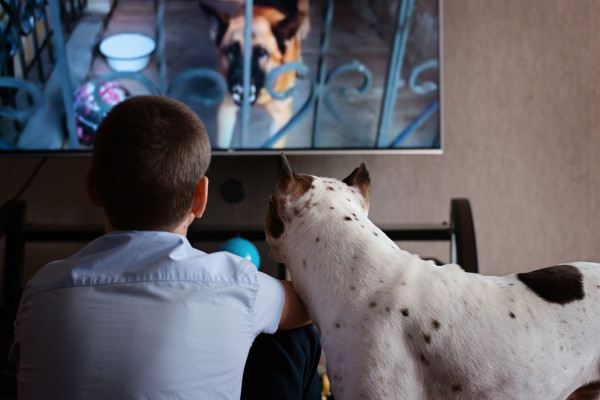
TV Isn’t Just for People Anymore: What Your Pet Really Gets Out of Your Favorite Shows
In just the last few weeks, I’ve seen two headlines about television stations for dogs. Bark TV introduced the “Barkademy Awards,” while DOGTV announced that it was expanding its horizons by offering content for dog owners (in addition to the programs it already offers for pets). While I love the idea of my pet watching an all-dog recasting of Friends, these stories did make me wonder what our furry friends get out of television, if anything at all.
Why Is My Cat a Couch Potato?
Upon reading these articles, my mind went to an example from my cats. In early January, I started playing a video game called Stray, where you play as a cat. My 10-month-old kitten was fixated on this game, and she watched me play for almost a full hour. My other cat, however, could not have cared less about what was happening on the screen. He would glance up at the TV if something caught his eye, or he heard a loud noise, but in general, he isn’t nearly as enthralled with it as my kitten. So why the difference?
As it turns out, there are a few reasons why your pet might watch TV. Sometimes animals stare at the screen just to figure out if the animals they’re seeing are real, which accounts for why some dogs will try to sniff the rear ends of other dogs onscreen. Generally, animals want to watch other animals more than they want to watch people.
As for cats, one reason they might watch your television is because they see quick movements or hear a startling noise, which can trigger their hunting instincts. Another potential explanation is that your pet just wants to spend time with you, so they’ll sit through your movie to soak up the attention and cuddles while you sob over Titanic (again).

Photo by JulieAlexK
The Good, the Bad, and the Fluffy
While your pet isn’t watching TV for the plot, there are actually a few benefits that your companion animal could get from some occasional screen time. Periodically having the television on can expose your pet to different noises, such as vacuums or fireworks, and help get them used to noises that might scare them otherwise. Some pets find TV, particularly programs made for animals, incredibly stimulating, and many pet owners turn the TV on when they leave the house to provide a little “enrichment” for their pet to keep them from getting bored or stressed. Similarly, some pet owners will play music for their pets, which has been shown to calm them down.
Though there are a couple argued benefits to your pet watching your favorite show with you, it’s important to take any potential risks into account. Fortunately, any harm that can come from watching pet TV is usually based on each individual animal. The most important thing to consider is your pet’s health and well-being. If your pet isn’t getting enough exercise or enrichment without the television on, it might be time to break out the old-fashioned tennis ball—all things in moderation, right? Similarly to how you can’t count on an iPad to raise your child, you can’t count on the TV to provide your pet with all the enrichment, attention, and exercise they need to be healthy and happy. You also want to pay attention to how your pet is responding to the television. If your pet appears to be stressed or frightened by the visuals and noise, then TV probably isn’t for them.

Photo by tomson_kz
Channeling Pet Health
As it turns out, my kitten was most likely excited about the other cat on the screen and not my video game skills. In general, TV for pets might have some benefits for your pet, but they could simply not care about it, like my adult cat. If you think your fluffy companion might enjoy watching television, it probably wouldn’t hurt to give it a try. Just remember to pay attention to how they respond and turn it off if they seem distressed by it.
As more human trends make their way into the pet space, the most important thing to consider is your pet’s health and well-being. Stay tuned to the Barking Mad podcast to learn more about pet behavior (and if your pet does have issues with noise or overstimulation, check out this episode about noise phobia in dogs).
Follow us on LinkedIn for the latest updates on all things happening here at BSM Partners.
About the Author
Cady Wolf is an Analyst at BSM Partners. She graduated magna cum laude with a degree in English from Brigham Young University-Idaho, and she currently lives in Rexburg, Idaho with her husband, their two cats, and pet tortoise. She loves animals and learning about how to help pet brands and pet parents alike.
This content is the property of BSM Partners. Reproduction or retransmission or repurposing of any portion of this content is expressly prohibited without the approval of BSM Partners and is governed by the terms and conditions explained here.